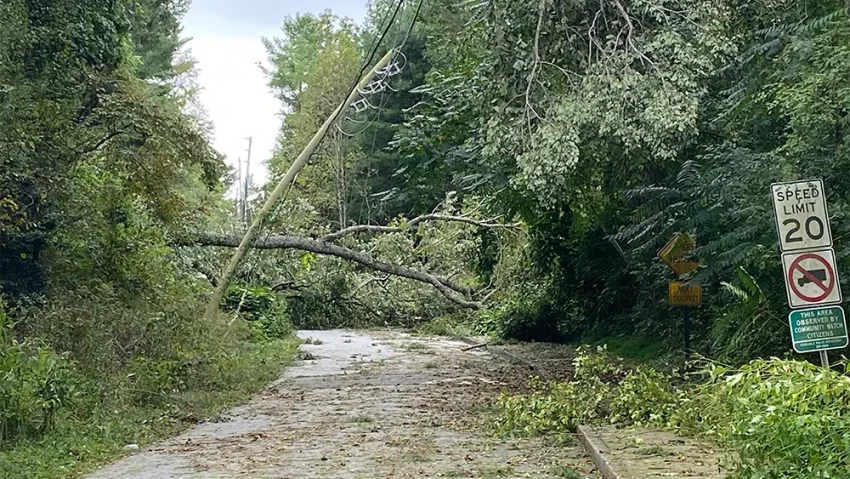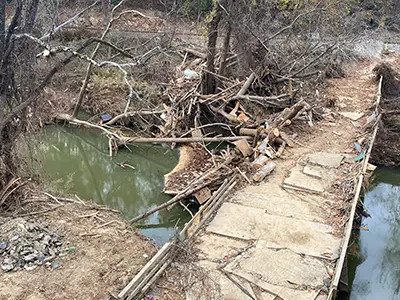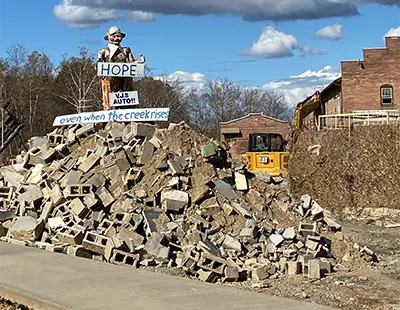
The mountains of western North Carolina are a lot of things to people of the Lowcountry. To some, they’re a respite from the relentless heat of a swampy Southern summer. To others, they’ve long represented safety. When hurricane season approaches, you plan your mountain escape because the mountains are the high ground for refuge. Safe. Secure. Until they’re not.
When Hurricane Helene dumped 2 feet of rain on the mountains of North Carolina in September 2024, dams failed and floods rose. Asheville’s River Arts District, home to local artists’ studios, galleries, cafes and more, filled with 16 feet of water. The road to Chimney Rock State Park washed away, along with the shops and restaurants that lined it. Entire neighborhoods were inaccessible for days, without electricity, water or cell service. It was impossible to find family members, and fear reigned. Until it didn’t.
These are stories of strength and resilience from the mountains of western North Carolina.
Layne & Anna’s Story
Layne Harvey and Anna Petit moved with their two children from the Lowcountry to Asheville eight years ago, seeking a vibrant, inclusive community. The children flourished while Harvey and Petit fixed up their century-old farmhouse, planting gardens and thriving. They volunteered for BeLoved Asheville, which serves the unhoused community, and frequented local music stores, concert venues and coffee shops.

When Helene hit, the Harvey-Petit family hunkered down, waiting for the worst to pass. Their daughter, then in her first semester at UNC Asheville, was home with them, and their son’s high school closed in advance of the storm. Things quickly turned upside down.
“After Helene, we didn’t have power for two weeks,” said Harvey. “We didn’t have running water for about the same amount of time.” They hauled water in buckets from backyard rain barrels and water stations set up in the parking lot of a nearby grocery store. When the water came back two weeks later, it was bypassing treatment plants and came out sludgy and brown, only usable for toilet flushing. It was a hot, sticky time as the family grew used to bathing with wet wipes until FEMA set up shower stations nearby.
Still, they knew how lucky they were. Their house sustained minimal damage, while many residences and businesses were far worse off. “And then something really cool happened,” said Harvey. “Before the storm, we barely talked to any of our neighbors. It was a very quiet neighborhood. But after the storm, as soon as we all realized this was a really bad situation, that changed dramatically. Every day, everyone was checking in on each other. We have some elderly people in our circle, and our neighbors came together to make sure they were okay. I was up on a neighbor’s roof with a chainsaw to get a tree out of their house. It was amazing to see how people came together.”
The sense of community was pervasive. Throughout the city, people opened their doors to share what they had. Beyond Asheville opened their warehouse doors to offer supplies to everyone who needed them. Once local businesses began opening their doors, customers returned, eager to help them stay afloat. It’s coming back. Asheville will return.
“I’m worried, though,” added Harvey. “I’m concerned the landscape of Asheville will change. Locals who lost everything and don’t have the money to reopen. They’re moving to other parts of the state or further out of town to open in a less expensive area. It puts things into perspective over how fortunate a lot of us were.”
Ever an optimist though, he added, “No matter what, though, throughout the year it was really heartening to see the support of our neighbors. Everyone was willing to help each other and make sure everyone had their basic needs met. That was incredible.”
Rob’s Story
Rob Weeter, president of Capstone Lifestyles, Inc., a kitchen and bathroom design studio in Hendersonville, North Carolina, was out of the country with his wife when Hurricane Helene unleashed the floods, inundating their building with several feet of water.

With airports across the region closed and flights to nearby areas overbooked, they were stuck in London until Oct. 7. And then, said Weeter, “When we arrived, we discovered that the landlord hadn’t done anything to mitigate the damage and dehumidify our showroom. Our showroom was a 3,000-square-foot space full of luxury kitchen and closet displays. We lost everything.”
Weeter and his family got to work. “We were trying to save anything we could,” he said. “Product samples, some appliances, workstation items, etc. We had help from family members, friends and vendor reps, but there was no one available to pay to professionally help us.” They loaded up trucks and moved items to a couple of storage units.
Unfortunately, the space wasn’t ready for occupancy, and it wasn’t safe to return. It could have been the end for Capstone Lifestyles, but, said Weeter, “through a friend who worked at Blue Ridge Community College, we were able to secure free office space in their Small Business Center for several months and continue to service our clients.” A stopgap, it kept the business going while Weeter applied for and received local grants. Then, he added, “through nothing short of a miracle, on Feb. 5 we found a place to call our showroom again.” After a fast and furious remodel, they reopened for business in the new location.
In terms of the future, Weeter knows it won’t be easy. “The rebuilding of infrastructure and residential and commercial property is just getting started here,” he said. Several weeks ago, he took visitors to see a project that Capstone Lifestyles recently completed. “On the way back, I showed them a house we completed cabinetry in three years ago that was completely removed by a mudslide. It’s still a pile of destruction.”
How You Can Help
It’s a common refrain. Throughout the region much has improved, but there’s more to be done. Some businesses have reopened but many remain shuttered. Asheville’s River Arts District remains largely decimated, its artists seeking higher ground. It’s not the only area.
In a vacuum, sometimes things fall apart. Vibrant, unique communities like Asheville and Hendersonville may change forever as chain restaurants and big box stores move in to fill the void. Other times though, something beautiful can grow in the wake of tragedy. Communities can come back, better than ever.
You can help the communities of western North Carolina find that happier way forward. How? It’s easy. Visit. Stay in local hotels. Shop local. Eat local. Give to organizations like BeLoved Asheville. Reach out to chambers to see what businesses are reopening and go.
The mountains of North Carolina have long been there for residents of the Lowcountry. Now, we need to be there for them.
By Leah Moore

Leave a Reply